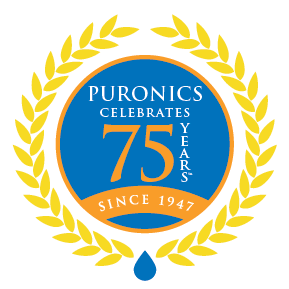Last Updated on April 8, 2021
I had a flareup of dry skin around my eyes, and I decided to go see a dermatologist about it. I was shocked when he said that it could have to do with my water, and if I took a break from washing my face with water, it might go away. I thought, “How could it be my water? Isn’t it just water?” What I didn’t know then was that my tap water contained hardness minerals and chlorine – contaminants which can have seriously detrimental effects on your hair and skin. I took the dermatologist’s advice, and it worked.
The water coming out of your tap isn’t just plain old H2O. Since water is the universal solvent, there are a lot of other things that can end up in it. Even if you’re on city water, it can wreak havoc.
I spoke with a licensed aesthetician/cosmetologist, and she told me about just what hard water and chlorine can do to your hair and skin. She also told me what you can do to deal with some of the problems they cause.
Effects of Hard Water and Chlorine on Hair
Hard water and chlorine strip your hair and scalp of their natural oils. They also cause breakage, which is one of the reasons you need conditioner. Hardness minerals build up in your scalp and can cause dandruff.
With hard water, soap doesn’t rinse away easily, so a layer of soap scum can build up on your hair, making it look dull and lifeless. That “squeaky clean” feeling is actually caused by the lack of natural oils and the layer of soap scum left behind.
If you color your hair, hard water and chlorine cause additional problems. They strip color from your hair, so your color doesn’t last as long as it should. For blondes or people who lighten their hair, chlorine causes a yellow or green tint.
Do you experience hair loss? Hard water could be making it even worse. The minerals build up in your hair follicles and the heaviness causes your hair to fall out.
Effects of Hard Water and Chlorine on Skin
Hard water and chlorine also strip your skin of its natural oils, which can cause or aggravate dryness. Chlorine can even make your skin crack, causing it to have a scaly texture and appearance.
If you have eczema or psoriasis, these contaminants can cause flareups or make flareups worse. For people with acne, especially cystic acne, chlorine inflames your skin and makes it worse.
Just like with your hair, a layer of soap scum is left behind on your skin when you bathe with hard water. You might apply lotion to help with the dryness of your skin caused by the lack of natural oils, but it only really helps for a couple of hours. This is because the lotion can’t reach your deeper layers of skin because of the soap scum left behind by hard water.
Solutions to Hard Water and Chlorine
If you have hard water, one of the most important things you can do for your hair is get a clarifying shampoo. Use it once to twice a week to remove the mineral buildup, then use a deep conditioner to remoisturize.
If you’re blonde or lighten your hair at all and your water is chlorinated, get a purple shampoo. This will neutralize the green or yellow tint caused by chlorine. You should be able to use it every day.
Another option for chlorinated water is to get a shower filter that contains activated carbon. This will reduce the amount of chlorine in your water. Look for one that’s certified to NSF/ANSI 177, which will reduce free available chlorine by at least 50%. Make sure to change the filters according to the manufacturer’s instructions, and only use filters produced by the manufacturer.
The best solution is to install a whole-house water softener and filter system, like the Terminator® iGen® C, which will also protect your pipes, appliances and clothes and save you money in the long-run. These systems contain a special resin to reduce hardness minerals and filtration media to reduce chlorine. You can request a free consultation and quote from your local Puronics Authorized Dealer.
After installing a water softener and filter system, you might feel like the water is slippery or the soap won’t rinse off. This is actually your natural oils, since they’re no longer being stripped away by the hard water and chlorine. It may take up to three to four weeks to adjust to the feeling. You shouldn’t wash your hair more; two to three times a week should be enough.
Questions? Contact us and let us show you how to improve your water.
© Copyright 2020 Puronics, Inc. All rights reserved.

 Puronics, Incorporated
Puronics, Incorporated



